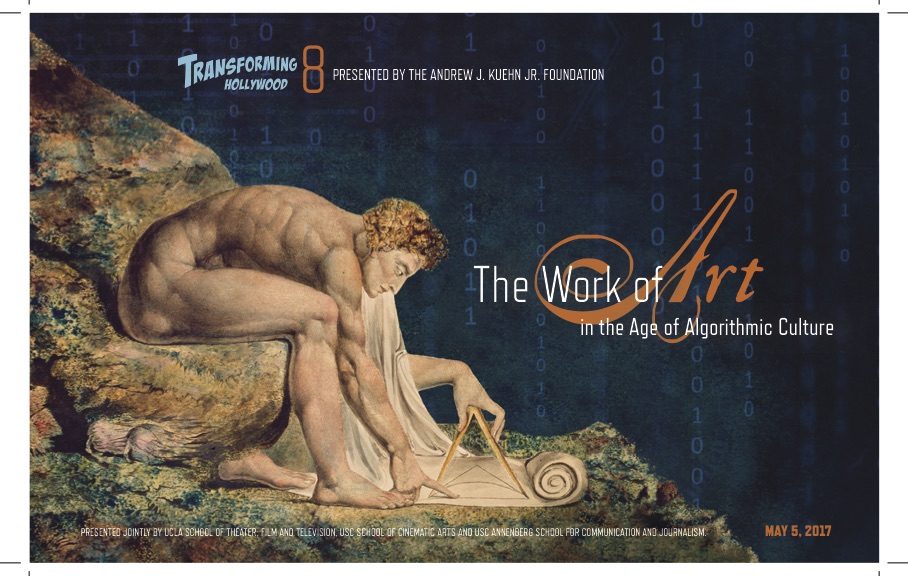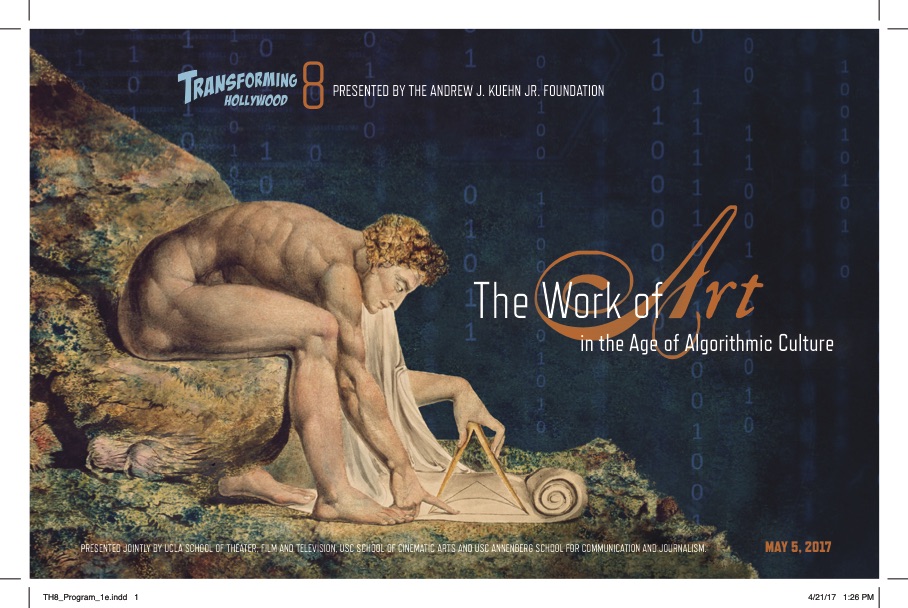WELCOME AND INTRODUCTION
9:00 a.m.-9:15 a.m.
Denise Mann, Head of the Producers Program, UCLA School of Theater, Film and Television
Henry Jenkins, Provost Professor of Communication, Journalism, Cinematic Arts and Education, University of Southern California
KEYNOTE PRESENTATION
9:15 a.m.-10:20 a.m.
Algorithmic Culture
Ted Striphas, Professor, University of Colorado Boulder
PANEL ONE
10:30 a.m.-12:00 p.m.
Playing With Snackable Content in Virtual Marketplaces
Moderator: Denise Mann, Co-director, Transforming Hollywood; Professor and Head of the Producers Program, UCLA School of Theater Film and Television
Peak TV’s premium quality TV series may be grabbing headlines, but new, addictive forms of “snackable” content nnahve become one of the preferred ways for brands to access millennials and Gen-Z’ers — digital natives whose facility with multitasking across mobile screens means they prefer images, short videos and emojis rather than lengthy (con)textual exchanges. Charles Eckert’s essay, “The Carole Lombard in Macy’s Window,” reminds us that Hollywood has always been always inextricably linked to consumer culture since the first cameraman pointed his camera at actors standing in front of a shop window in the 1910s; however, it is important to recognize the massive shift underway as the new “social media logic” associated with the 21st century effaces the “mass media logic” that dominated in the 20th century. The corporate gatekeepers of the tech economy are engineering innovative user experiences (UX) and user interface (UI) features, such as touch, liveness and VR/AR, to keep us happily engaged on their platforms for extended periods of time. Hence, we are encouraged to click, like, share and comment on an arsenal of new, addictive, forms of online entertainment, including Pokemon Go, Snapchat filters, Amazon Twitch, Facebook Live, Instagram Shop Now buttons and Pinterest pins. Today’s panelists represent key stakeholders whose in-depth understanding of UX/UI design elements is facilitating new forms of algorithmic culture designed to enhance our sense of play inside 24/7 digital ecosystems.
PANELISTS
Larry Fitzgibbon, CEO and Co-Founder, Tastemade
Thomas Jorion, Head of Strategy and Innovation, Havas 18
Rob Kramer, CEO and Founder, PurposeLab
Kym Nelson, Senior VP of Sales, Twitch
Ted Striphas, Professor, University of Colorado Boulder
PANEL TWO
12:15 p.m.-1:45 p.m.
Fake News and Struggles Over Circulation
Moderator: Henry Jenkins, Co-director, Transforming Hollywood; Provost Professor of Communication, Journalism, Cinematic Arts and Education, University of Southern California
Sensationalism is scarcely new in the history of American journalism, and the circulation wars of the early 20th century contributed to the rise of “yellow journalism,” as William Randolph Hearst, Joseph Pulitzer and the other media tycoons of the era fought for the eyeballs of an expanding American readership. Today’s “fake news” also has its roots in new struggles about circulation, though in this case, the circulation of news is through social networking sites. The role of “fake news” in the past presidential campaign has been hotly contested, with the current administration accusing CNN and the New York Times as publishers of “fake news,” while others point to the role that Twitter, Facebook and other social media platforms played in blurring the line between reliable and questionable media sources.
Fake news thrives because it is often more emotionally targeted than traditional journalism because it is designed to shock and outrage its readers, and because it often conveys what people living in filter bubbles already believe to be true about the world. Fake news is news that has been manufactured to spread like wildfire without regard to its accuracy or its consequences.
What do we know about fake news and the people who produce and consume it? What does it tell us about the place of journalism in the era of algorithmic culture and social media? What efforts are being made by social media companies to take responsibility for their role in the spread of misinformation? What alternatives for journalism are emerging within the same environment to insure more trusted curatorship over news and information? How are the struggles over what constitutes “fake news” shaping our current political realities?
PANELISTS
Mark Andrejevic, Professor of Media Studies, Pomona College
Brooke Borel, Journalist and Author of The Chicago Guide to Fact-Checking
Hannah Cranston, Host and Executive Producer, ThinkTank; Guest Host, The Young Turks
Jon Passantino, Deputy News Director, BuzzFeed News
Ramesh Srinivasan, Associate Professor, Information Studies and Design/Media Arts, UCLA
Laura Sydell, Correspondent, Arts Desk, NPR
LUNCH
1:45 p.m.-2:45 p.m.
PANEL THREE
2:45 p.m.-4:15 p.m.
Music Streaming & The Splinternets: The New, Competing, Cultural Curators
Moderator: Gigi Johnson, Executive Director of the Center for Music Innovation at the UCLA Herb Alpert School of Music
Spotify, Apple Music, Pandora and Google Play Music are the current leaders in the subscription-based and advertising supported music-streaming derby — having locked down the majority of artists through massive licensing deals with the major music labels. The current crisis facing the streaming tech giants is the abundance of choice available to consumers, who are drowning in an endless supply of things to watch, read or listen to online. As a result, the streaming giants have enlisted “an elite class of veteran music nerds — fewer than 100 working full-time at either Apple, Google or Spotify — who are responsible for assembling, naming and updating nearly every commute, dinner party or TGIF playlist on your phone,” according to Buzzfeed’s “Inside the Playlist Factory.” Apple Music started the trend in 2014 when it acquired Beats Music along with co-heads Jimmy Iovine, Dr. Dre and Trent Reznor, as their ultimate marketing weapon to challenge Spotify’s lead. Iovine insists that the tech corporations use the human music experts to guide tech engineers, and not vice versa, stating: “Fans can smell the difference between a service where much of the product is dictated by algorithms or charts and one that is guided by more knowledgeable but equally passionate versions of themselves.” This panel focuses on the growing industry of cultural curators who organize playlists “by reading endless music blogs, tracking artists before they have been discovered, and by maintaining contact with artists’ managers, producers and label representatives.” Needless to say, the economic driver of this on-demand streaming culture is consumer data analytics targeting advertising brands. Feeling lonely after a particularly bad break up? Try listening to Adele while stuffing your emotions with a quart of Ben & Jerry’s and a Diet Pepsi.
PANELISTS
Matthew Adell, CEO and Founder, MetaPop
Shanna Jade, Director of Community, Stem
Alex White, Head of Next Big Sound at Pandora
PANEL FOUR
4:30 p.m.-6:00 p.m.
Creating Binge-worthy “Streaming Web TV”
Moderator: Neil Landau, associate director of screenwriting for television, UCLA TFT; author of TV Outside the Box and The Showrunner’s Roadmap
Most credit Netflix with launching the 21st century “web TV” revolution, and with it “peak TV,” by introducing the phrase “binge-watching” into the lexicon and by fundamentally altering the way we watch and access television online. Everything changed, according to Thomas Schatz, when Netflix “barged into the high-stakes original series programming derby in 2013 with House of Cards and Orange Is the New Black.” Never have so many buyers prompted so many creators to step up and pitch original concepts. FX conducted a study and determined that in the years 2009 to 2015, the number of scripted series went from 200 to 400+. In 2016, Netflix produced 600 hours of scripted TV and in 2017 it said it would spend $6 billion on both scripted and acquired series. The good news is the excitement associated with this ramp up of creative opportunity; the bad news is that in the current world of overabundant online content, consumers are swimming in series they’ll never see once, let alone watch in their entirety. As in previous eras, writers, actors and showrunners with credits under their belt are in high demand and earning large salaries to attach their names to lesser-known creators. At the same time, untried writers, actors and comedians are staking their futures on self-financed webseries productions using personal funding from part-time jobs, crowdsourcing and by promoting themselves on social media — all in the hopes of catching the lightning in a bottle success associated with Broad City, Insecure, and High Maintenance. Streaming TV is grabbing lots of attention (and subscribers), but the question remains: “Will the current boom cycle continue indefinitely or has ‘peak TV’ peaked?”
PANELISTS
Jessie Kahnweiler, Creator, The Skinny (Hulu)
Zander Lehmann, Creator, Casual (Hulu)
Dawn Prestwich, Co-executive Producer, Z: The Beginning of Everything (Amazon)
Nicole Yorkin, Co-executive Producer, Z: The Beginning of Everything (Amazon)
RECEPTION
6:00 p.m.-8:00 p.m.
James Bridges Lobby, Melnitz Hall


 Click to View Program
Click to View Program